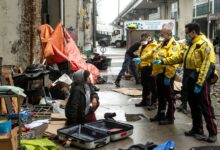On the road in Canada’s conservative heartland
On the dusty main street of Rowley, Alberta, time stands still.
Boarded-up storefronts and antique gas pumps sit idle, these days used mostly as a set for films or a backdrop for selfies from curious road-trippers.
The last big change here came when the railway pulled out in the early 1990s, putting the final nail in a once bustling prairie town’s economy.
No surprise, then, that for the eight people who still call Rowley home, change is viewed with skepticism, something to be resisted, not embraced.
Mike Mckee is one of the holdouts here. The farmer was born and raised in the area, and says it’s a mentality that has made him and other people here some of the most politically conservative in Canada.
“It has always been that way out here,” Mckee says.
He might be right. In the last provincial election, conservative candidates in the east-central riding of Drumheller-Stettler, where Rowley is located, received more than 80 per cent of the vote. Federally, conservatives also regularly receive more than four in five votes in the area. And polls show conservatives in the lead in Alberta ahead of Tuesday’s election.
It makes this part of the country a good place to check the political temperature of conservatives in Canada at a time when the movement could be seeing a resurgence: conservative parties have recently won elections in Ontario, Quebec and New Brunswick, and the federal Conservative Party has pulled ahead of the Liberals.
Standing in sawdust behind the bar at Rowley’s community-run saloon, Sam’s, Mckee says that trend doesn’t surprise him. He believes conservatives here and across Canada simply want government to “leave us the hell alone and let us do our own thing.”
According to Mckee, public enemy number one for conservatives these days is carbon taxes and the governments behind them.
“I think it’s a farce. I don’t think that anthropogenic climate change means anything other than a tax grab.”
Mckee and his neighbours say the support for scrapping the tax is one reason political power is shifting to the right across Canada: “Alberta for sure. Not as sure about Ottawa but we hope.”
It’s an understandable grievance in a riding the size of Belgium where a lot of time is spent on the road burning fuel, and where pulling oil from the ground is a way of life.
This is the heart of Alberta’s conventional oil and gas sector; along with carbon-intensive agriculture, it’s one of the two industries that butter most people’s bread in these parts.
There is a feeling here that both the provincial NDP and the federal Liberals have been less than supportive of the energy sector over the last four years, failing to get any new pipelines built while making it harder to get new projects off the ground.
For Mckee, it’s a failure that has him thinking about the future of Alberta in confederation.
“We need out of Canada as a province,” he says. “I’m really leaning towards a separatist movement out here — I just don’t see any other way around it.”
He isn’t alone. The United Conservative Party’s candidate in the riding, Nate Horner, says that many of the voters he runs across bring up the idea of secession. “In some places, a vote on separating would be close,” he said.
Horner and the UCP aren’t ready to talk about separating, but they are ready to tick off a lot of the other boxes for these voters, like scrapping the carbon tax, cutting red tape and being more aggressive in the pursuit of a new pipeline.
“This is where we draw the line in the sand and we fight to get a fair deal in Canada.” Horner says while chatting to local business owners at the only cafe still open in the town of Veteran.
Key to that fair deal, for Horner, is getting more pipelines built. “If we have to shut off the taps to B.C., if we have to have a referendum on equalization to try to get some leverage out of the feds — everything is in play, because we simply aren’t being heard.”
It’s a message that people like Rachel Robinson, who runs T&E Pumps, a company that manufactures equipment for use in the oilpatch, want to hear.
Getting Alberta’s stagnant economy fired up again is her priority — one that will see her supporting a conservative candidate in the upcoming election, despite a string of racist and homophobic statements connected to some UCP candidates.
“I just want to be here and do my thing. I don’t see skin colour, I don’t see sexual orientation, I don’t care about that stuff,” Robinson says.
In this part of the world, Robinson is in the majority, and conservative voters here are spoiled for choice in this election.
About 70 km to the southeast, another conservative contender is campaigning over coffee at the General Store in Sedalia.
Incumbent MLA Rick Strankman lost the UCP nomination in this riding to Horner when the province’s Progressive Conservative and Wildrose Parties merged in 2017, but the veteran politician, running as an Independent, likely remains Horner’s stiffest competition.
Standing amidst the canned goods and power tools in the country store, Strankman is the latest in a long line of conservative MLAs here, and believes many of the frustrations felt by conservatives in Alberta are shared by other Canadians.
“I see many people who want to have less government involvement, less taxation and better effective use of those taxpayer dollars,” he says. “I think everyone just wants to co-habitate, if you will, without frustration of government.”
And Strankman says there is a “feeling of alienation” in Alberta that he says voters want to “rectify in some fashion.” He too has heard the rumblings of Alberta separation as he knocks on doors in his expansive riding.
It’s telling that at an all-candidates forum later that night in Consort, about 50 km to the north, the local NDP candidate was a no-show. Of the candidates that did take part, none support a carbon tax.
“It was all right of centre,” said Kevin Van Lagen, the principal of a nearby rural school. “There was no centre tonight, and anything left of centre didn’t show up because there would be no place for them.”
Van Lagen says the candidates reflect the riding they want to represent, and that the local New Democrat stayed home because “they knew they wouldn’t have a friendly audience.”
It isn’t hard to find signs of those feelings of anger and western alienation here.
“They don’t know we exist,” says Mary Readman, who ran the local paper for decades. “The world ends at Winnipeg. They don’t give a damn about Western Canada at all.”








Redes Sociais - Comentários